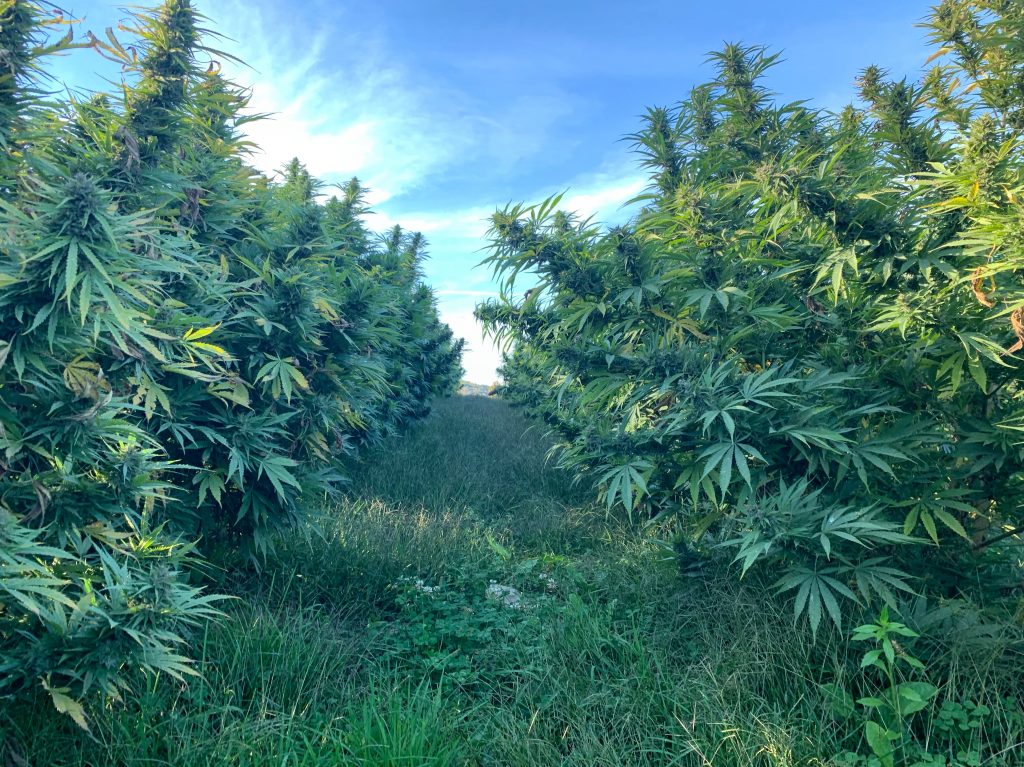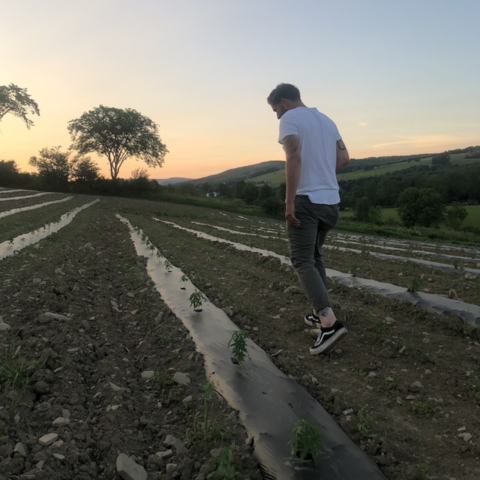From Farm to Dropper, Pt.1
Each bottle of TONIC is created with intention. As the Cannabis industry grows rapidly, and huge corporations clamor for a piece of the pie, TONIC stays true to their roots literally and figuratively.
A true family-run operation (try to follow along here…)
Brittany [Tricolla] Carbone is the Founder/CEO of TONIC
Erik Carbone, is the Lead Grower at Tricolla Farms (and Brittany’s husband)
Tricolla Farms is owned by Brittany’s parents and uncle.
Mom (Susan) is the TONIC office manager and the one who packs up all of your orders and gets them out the door.
Dad (Rick) and uncle (Phil) help run operations on the farm, along with Erik’s father, Rocco.
**Fun Fact** Brittany & Erik actually got married on the farm in 2015, which lead the Tricollas to turn the Barn @ Tricolla Farms to a full-fledged wedding venue!
One of the many qualities that sets TONIC apart from all the other CBD brands popping up is the care and control from farm to dropper.
Brittany & Erik translate their passion for the plant into helping people bring balance into their lives, by ultimately allowing healing to happen naturally and effectively.
Part 1 of this series digs deep with Erik Carbone about what it takes to be a successful hemp farmer on Tricolla Farms in Upstate NY.
The first harvest on the family farm happened in 2018 – seeing how large corporate entities with little to no love for the plant itself were getting involved in a very industrialized way.
In the words of Erik, “We started our own hemp farm because we wanted to be able to control quality from seed to bottle. In the early days of this industry there was not a consistent source of great material so we decided to take it into our own hands.”
—
LAUREN MOONEY: What kind of education happens before ever planting? And how did you learn how to farm?
ERIK CARBONE: I read about a dozen or so books – everything from cannabis growing books to plastic row cropping books, and irrigation books.
I had a general knowledge of plants growing up. My entire backyard as a kid was full of tomato plants, cucumbers, zucchinis, grapevines, and strawberries. My father really had a green thumb. And from a young age, I was always helping him tend the garden.
Before we decided to start the farm my background was in all phases of construction: building houses, brick and cement work, and operating heavy machinery. So I was able to translate 15 years of my construction knowledge into the farm, especially with operating the tractors, digging diversion ditches for drainage, as well as setting up my irrigation system.
LM: When does planting season typically start for hemp?
EC: In early May we plant seeds in 72 count trays and germinate in a greenhouse for about a month. And then we typically try and start planting our rooted plugs into our fields the first week of June.
LM: What is needed supply wise for a successful planting?
EC: Well-drained fields, a few different tractors. Smaller tractors are suitable for laying down our plastic rows and planting. While our bigger tractors are used for plowing and disking* our fields. And multiple barns or warehouse space to be able to dry your crops.
*Plowing is a deep turning of the soul. Disking cuts and breaks up large lumps of soil that have been turned by the plow.
LM: What is one of the biggest challenges growing hemp?
EC: The biggest challenge is the harvest. It is very labor-intensive and we like to do all of our harvestings by hand rather than using industrial dryers or mulching whole plants for the sake of speed. We take our time and cut each and every plant by hand; as well as hanging each individual branch in one of our barns, in order to keep our plant’s cannabinoid-rich.

LM: How do you make sure your hemp crop has less than .3% of THC?
EC: First off we chose which genetics we use very carefully. By using a solid and tested genetic you can ensure that the THC levels will be below .3%. We also walk our fields daily to make sure that we do not have any rogue male plants in our fields. The chances are low but if a male does propagate it can pollinate our entire female population of plants and can have a chance of spiking THC levels.
Another factor that can contribute to a rise in THC levels is stress on the plants. So we make sure to be as gentle as possible and keep all the feeding and watering cycles as scheduled as possible. This is not always easy with Mother Nature. But we can mitigate these stresses by working with nature; tracking rain and other weather patterns to help us decide when to water our crops.
LM: What is the most magical aspect of planting?
EC: Learning the language of this magical plant. If you know what to look for and watch the plants they will tell you exactly how they are feeling. The leaves and flowers of the plants will tell you everything you need to know; if they are hungry, or thirsty, exactly what kind of nutrients they need, it goes on and on. But mostly for me it’s waking up every morning and all I want to do is be in my fields. The feeling that washes over me when surrounded by these incredible living things is indescribable. It, for lack of a better term, becomes extremely addictive. The energies that you feel coming from all of these beautiful plants is one of the best feelings I’ve ever felt.
LM: What was the thing that surprised you the most in learning how to grow?
EC: What surprises me the most is] how connected you can become to this incredible plant. I’m still learning something new every day.



 The Steady Supply
The Steady Supply

 Personalized Vibes
Personalized Vibes
